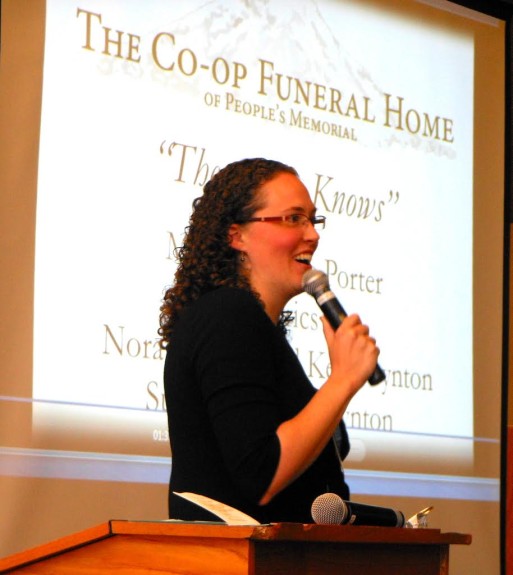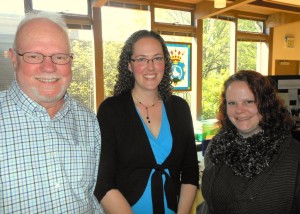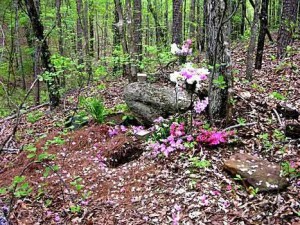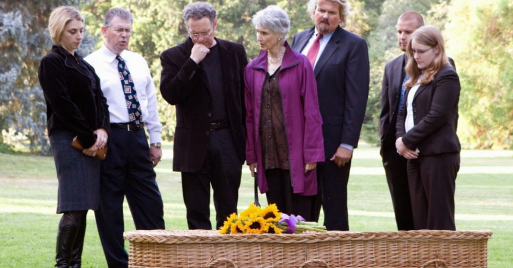Today is SevenPonds interview with Nora Menkin, Managing Director of The Co-op Funeral Home of The People’s Memorial in Seattle. The Co-op Funeral Home of People’s Memorial is one of the only cooperative funeral homes in the country, and here Nora talks about its origins, how it works and how she became involved.

Nora Menkin
Ellary: I understand that The Co-op Funeral Home of People’s Memorial is a funeral home owned by the members of People’s Memorial Association. Will you explain what the People’s Memorial Association is?
Nora: The People’s Memorial Association was founded in Seattle in 1939. It was formed when a group of churches got together to try to find a solution to the high prices that their members were having to pay for funeral services. They thought there had to be a better way.
So, they approached one funeral home in town and said, “We’ll send all of our members to you, but you have to give them a set price that we’ll negotiate with you, a set price that’s a fair price for a simple service. You need to offer this newfangled thing called cremation (cremation was starting to come into the mainstream but wasn’t very popular at the time) if that’s what our families want. There’ll be no sales pressure, and you’ll make up for your loss of revenue from the discount you’re giving everyone by the volume of people we’ll send to you.”
Ellary: How long did that partnership between the People’s Memorial Association and the local funeral home last?
Nora: That partnership lasted for over sixty years until the funeral home got bought out. After Jessica Mitford’s book “The American Way of Death” came out in the sixties, the membership of the People’s Memorial Association grew to over 100,000. There was a lot press being generated, a lot of blow back on the funeral industry. So the membership got really big and extended beyond Seattle. There was also a similar memorial society in Central Washington and in Eastern Washington. In the last twenty years they’ve all merged; we’re all one organization, The People’s Memorial Association, that serves all of Washington.

Ellary: What happened when that funeral home was bought out?
Nora: It was decided after the funeral home got bought out that we wouldn’t contract with any corporate funeral homes anymore. We decided that the funeral homes we worked with had to be independent family-owned funeral homes. We have a set price that we negotiate every two years. We say, “We’ll send our members to you and you’ll give them this set price that we’ve negotiated. If they want something beyond what we negotiated, then they get a 15 percent discount off your normal price list.” Now we’ve got 19 funeral homes across Washington.
Ellary: So The Co-op Funeral Home of People’s Memorial is one of the funeral homes that People’s Memorial Association members go to?
Nora: Yes. We’re unique because we function as a cooperative, so we are owned by the more than 80,000 members of the People’s Memorial Association. All of the members, no matter where they live, own The Co-op Funeral Home. The Co-op Funeral Home serves the Seattle area, which is where most of our members are. We also have partnerships with other funeral homes to offer services that are more local to where the member might live.
Ellary: This is the only funeral home that members of the People’s Memorial Association actually own, this is the only co-op?
Nora: Correct.
Ellary: How involved are the members of the People’s Memorial Association in The Co-op Funeral Home?
Nora: Ninety-nine percent of our members are not involved on a day to day basis, they just call us when they’re in need of services. But we do have some people that are more involved and offer their talents where we need them. We have committees that help run the organization: a finance committee, a marketing committee, a legislative committee that helps us keep an eye on the state legislature so that they don’t pass any laws or policies that are consumer averse. So those are all volunteers, and members serve on those committees, and they can serve on the board of directors.
Ellary: So how did The Co-op Funeral Home of People’s Memorial get started and how closely is it functionally linked to the People’s Memorial Association as an organization?
Nora: Our start up costs were completely raised by donations from our members; we opened our doors in 2007 without any debt. We share a board of directors with the People’s Memorial Association. The PMA is the non-profit side, and then the co-op funeral home is the business. The directors are chosen from our membership, and I report to the Board. Managing Director is my title, and I’m in charge of the funeral home. Kathy Long is the executive director of the People’s Memorial Association. We work very closely together because we have a very closely aligned mission.
Ellary: How long have you been working at The Co-op Funeral Home?
Nora: We opened in 2007 and I started here when our doors opened as an intern. Then I got my funeral director’s license and I was made managing director in 2014.
Ellary: What prompted your interest in getting involved as an intern?
Nora: I got interested in home funerals and the alternative funeral industry because I had two friends die when I was in college. Their funerals were polar opposite examples of how funeral services could be conducted. For one friend, who was Catholic, the family went the traditional funeral route. They had a viewing beforehand and a procession to the church and a procession to the cemetery. Thousands and thousands and thousands of dollars later, no one felt that the experience had been a positive one. There was no sense of closure because the ceremony was completely impersonal. It didn’t speak to who he was as a person at all.
Then the other friend died a sudden death. He’d been in an accident, and the family turned the service over to his friends because we were all theatrical types. They asked us to do something that honored him for who he was. So we put together a video and we chose people to speak about him individually. The family was Christian, and they had a couple of religious elements in the ceremony, but it was basically a ceremony that honored him. I felt much better after that experience. Everyone at the funeral told us how rare it was, and I said to myself, “That’s how it should be for each person.”
So I started looking into the funeral consumer advocacy movement and home funerals and individual ways to honor people and give people choices. I was very interested, so I came on board and got trained. I did apprenticeship hours as an intern, and then sat for my funeral director license exam. And I’ve been here ever since.

Credit: Nora Menkin
Ellary: As Managing Director of The Co-op Funeral Home of People’s Memorial, are you personally involved in helping plan the funeral services for individuals who have passed away? Do you personally meet with families to plan services?
Nora: Yes, I meet with families in addition to running the day-to-day operations. We also have two other licensed funeral directors on staff, and they do the majority of that work. There are three of us that are licensed and meet with families. I also have one intern that comes in a couple hours a week and is learning that part of the business as well. But we all do a whole lot more work than a funeral director at a traditional home does. Last year we served 840 families. A traditional funeral home would have much less volume than that and they would have far more staff.
Ellary: Aside from the affordability of a funeral cooperative, what do you think the benefits of the funeral home being member owned are for its members?
Nora: Well, they know that we are serving them for their benefit and that of the community. We’re not reporting to shareholders; we’re not reporting to an owner who is relying on the income for their livelihood. It’s really about accountability and who we are here for. And we’re here to serve our members.
At the same time, we want to have a competitive and fair business model too. We compensate our employees well and make sure that everyone has a good standard of living. We’re not the cheapest funeral home in town. Some places definitely have lower prices than us. But people that come to us know exactly what they’re going to get. Whether they’re getting cremation or a full, traditional funeral service, we treat everyone exactly the same. Whereas other places, many kind of write people off with, “Oh, you’re just cremating. I’m not going to really talk to you again.”
Ellary: What was so impactful about Jessica Mitford’s book “The American Way of Death” when it was published in the sixties?
Nora: I think a lot of people at that time had an idea that the funeral industry was predatory. But because people only plan one or two funerals in their lives, they couldn’t see the industry for what it is. It’s not something that people want to dwell on either. They want to get it over with and be done.
Then Jessica Mitford said, “This is how this industry is treating people, and this is what people have come to expect, but we deserve better.” It was a rallying cry for people to start thinking about what was important to them. Rather than be told what to do, they wanted to be able to make their own choices and not go broke going through this thing that everyone goes through at some point.

Credit: dexknows.com
Ellary: Would you call “The American Way of Death” sort of the beginning of the funeral consumer advocacy movement?
Nora: Actually, the People’s Memorial Association predates the publication of that book. The People’s Memorial Association has been around since 1939, so there were definitely rumblings of discontent before it came out. And there were separate home memorial societies and funeral societies, but they definitely were on the fringe.
But when “The American Way of Death” came out, it brought the funeral industry’s practices into the light, and that certainly laid a foundation. A whole lot more memorial societies opened up around the country, and there was definitely a rallying cry to get the Federal Trade Commission involved. People felt that we needed to have some laws governing the industry’s shady business practices, and this led to the FTC’s passage of the Funeral Rule in 1984. After that, funeral homes had to charge the richest man in town the same amount they charged the poorest man in town. They couldn’t pad their books based on what kind of suit the guy was wearing when he walked in the door.
So that was big, but after the Funeral Rule went through, people got complacent again. So, now we’re kind of in this new movement, with the baby boomers realizing that death is something they need to have a relationship with in their daily lives. They’re also realizing that that law is now outdated because it doesn’t say anything about posting prices on websites or giving prices over email because those things didn’t exist in 1984. So funeral homes can kind of cloak their prices and say, “Well it’s not price that matters, it’s the quality of the service you receive.” But, in fact, the cost matters!
Ellary: I see that you’ve given talks at places such as Reed College. Is that something that you do regularly — speak at green burial or funeral consumer advocacy conferences or conventions on alternative funeral practices?
Nora: Well it’s a very small world, and if someone has a forum like that I’m happy to speak about what we do. The one at Reed College actually gained some notoriety. It was really well attended and it was obvious that there was a hunger for this kind of knowledge that wasn’t being provided anywhere else.
The People’s Memorial Association also does workshops and seminars on a pretty frequent basis. For instance, we have a program called “Got Your Ducks In a Row?” In a couple hours, we have an estate planning attorney, an advanced directives specialist and a funeral planning person (which is usually me) go over issues about end of life stuff. The program is available to anyone who wants to attend. We suggest a $10 donation, but no one has to pay. We believe that the more information you have, the better equipped you are to make decisions around these difficult times.

Credit: cometappears.blogspot.com
Ellary: Do you have any thoughts about what you want for your own funeral?
Nora: When I first came here, I thought I wanted to be cremated. My stance was that what happens to the body after I’ve left it doesn’t matter. But now I’ve really come around and decided that I want my body to be productive, so I really love the idea of a natural burial — a green burial. I would like to be placed somewhere that helps conserve the land. I love the idea of conservation natural burial, especially living in an urban setting. If we could designate an area of forest to make a conservation cemetery to make sure that it’s never torn down or developed, that would be my ideal situation.
Ellary: Post-mortem eco-activism.
Nora: That’s me.
Ellary: Is there anything else you’d like to say about The Co-op Funeral Home, the People’s Memorial Association or about the funeral consumer advocacy movement?
Nora: I’d recommend looking into the Funeral Consumers Alliance if you haven’t. They are the national organization that we are the Washington State chapter of. They were formed in 1954, so the People’s Memorial Association predates them, but they do wonderful work. We’re by far the biggest and strongest organization of our kind, but there are all kinds of affiliate sisters that are doing what we do on a very small scale. They might just do price surveys for local people so people know that they’re comparing apples to apples when they’re price-shopping for funerals. Many are doing advocacy work — keeping an eye on the state governments and making sure they aren’t passing laws that are consumer averse. So that’s worth looking into!
Ellary: Thanks for the information, Nora. I’m sure our readers will appreciate your insights.
Nora: You’re very welcome.

 What Is The Benefit of A Member Owned Cooperative Funeral Home? An Interview with Nora Menkin
What Is The Benefit of A Member Owned Cooperative Funeral Home? An Interview with Nora Menkin



 Our Annual Seven Holiday Gifts for Someone Who Is Grieving, 2024 Edition
Our Annual Seven Holiday Gifts for Someone Who Is Grieving, 2024 Edition
 “Making Mobiles” by Karolina Merska
“Making Mobiles” by Karolina Merska
 “Hands Up to the Sky” by Michael Franti & Spearhead
“Hands Up to the Sky” by Michael Franti & Spearhead















Thanks for talking with me! Two little corrections. It is a 15% negotiated discount with other funeral homes when families request something not previously negotiated, not 50%. Blame the phone call for that error in translation. And our website is “www.funerals.coop” no .com necessary!
Report this comment
I’m sorry for my delayed reply. Thanks for your wonderful interview and these corrections were made awhile back! 🙂
Report this comment
What a brilliant idea. I’d like to be part of a funeral home co-op in LA. Thanks for this interview Nora and Ellary.
Report this comment
I’m glad you enjoyed this interview! Thank you for visiting! 🙂
Report this comment